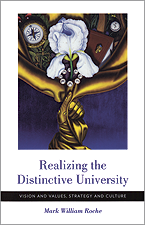
Mark William Roche.
Notre Dame Press, 2017; 88 pp;
ISBN: 978-0-26810-146-6.
by Alan McGreevy
Realizing the Distinctive University is a distillation of Mark William Roche’s accumulated knowledge and perspectives from his 11 years as dean of the college of arts and letters at the University of Notre Dame. The central element running through the book is that a leader must have a vision for what they want their institution to be, and not to be, to guide their day-to-day decisions. This theme is reiterated through sections on hiring and promotion, curriculum, collaboration and community, sharing stories of successes, and lessons learned through less successful endeavours.
The book is divided into three main sections: vision and change, embodying and funding the vision, and structures, strategies and struggles. The first section, making up a quarter of the book, addresses the history of the university as a concept and how an administrator can craft their feelings about the strengths and weaknesses of their institution into a vision that can guide strategic planning and inspire faculty, staff and students. The second section, the second quarter of the text, provides strategies for longer-term management, working within the university strategic plan and securing funding. The last half of the text addresses more specific challenges that administrators tend to face, grouped by theme. For example, the chapter on flexibility considers the advantages and disadvantages of firm regulations versus supporting academic initiative from faculty members. Other chapters deal with the benefits and pitfalls of inter-university competition and of using incentives to encourage and reward faculty research or course development. Roche addresses evaluation and criticism looking at faculty evaluations, accountability to students, means of evaluating an institution and the mechanics of reviews for departmental chairpersons and deans. The final chapter on community considers the role of the university as alma mater, fostering collegiality and mentorship among faculty members and morale among support staff.
Roche begins by providing some of his background, his professional history and a handful of carefully-chosen anecdotes which humanize him without undermining his voice. He gives a brief history of the university, starting with the 19th century German university as the cornerstone of the modern university model, though the author’s background as a professor of German language and literature may influence his frame of reference. The German universities integrated the roles of teaching and research, and the pursuit of knowledge for its own sake with strong government funding. Roche argues that the successes of this approach can be measured in the disproportionate number of Nobel Prizes awarded to Germany through the 19th and early 20th centuries. This system was adapted further into the American model, defined by rigorous competition between institutions and a focus on applied research and professional schools. Throughout the book, the author’s experiences as a young faculty member at Ohio State and as an administrator at Notre Dame serve as the two exemplars of the American system. The book describes the idealized, aspirational heights of the university concept and then explores why such heights are rarely attained.
The overall structure of the book then works its way outward: from the vision in the dean’s office, to working with other administrators and faculty, to the culture of the university community. Roche provides a glimpse into the life of a university dean, and is optimistic and encouraging without degenerating into Pollyannaisms. His writing is more conversational and ruminating than concise, forgivable as the book is structured to keep the topics moving while avoiding repetition. The topic of being part of a Catholic university comes up in several of Roche’s anecdotes, but is framed generally as advice for leaders in a specialized setting where a distinctive identity, legacy and vision may already be in place.
Roche, naturally, writes for an American audience, so some sections translate fairly smoothly to a Canadian environment and others do not. A Canadian reader would need to be well-versed in our national circumstances to know whether things like tuition, the public school system and ethnic backgrounds play out the same way in Canada as they do in the United States. Admissions programs, financial aid, scholarships and athletics are all things that Roche cannot give a Canadian perspective on, but his broader advice makes the book worth reading.
---------------------------------------------------------------
Alan McGreevy is a biology instructor at the University of Winnipeg.